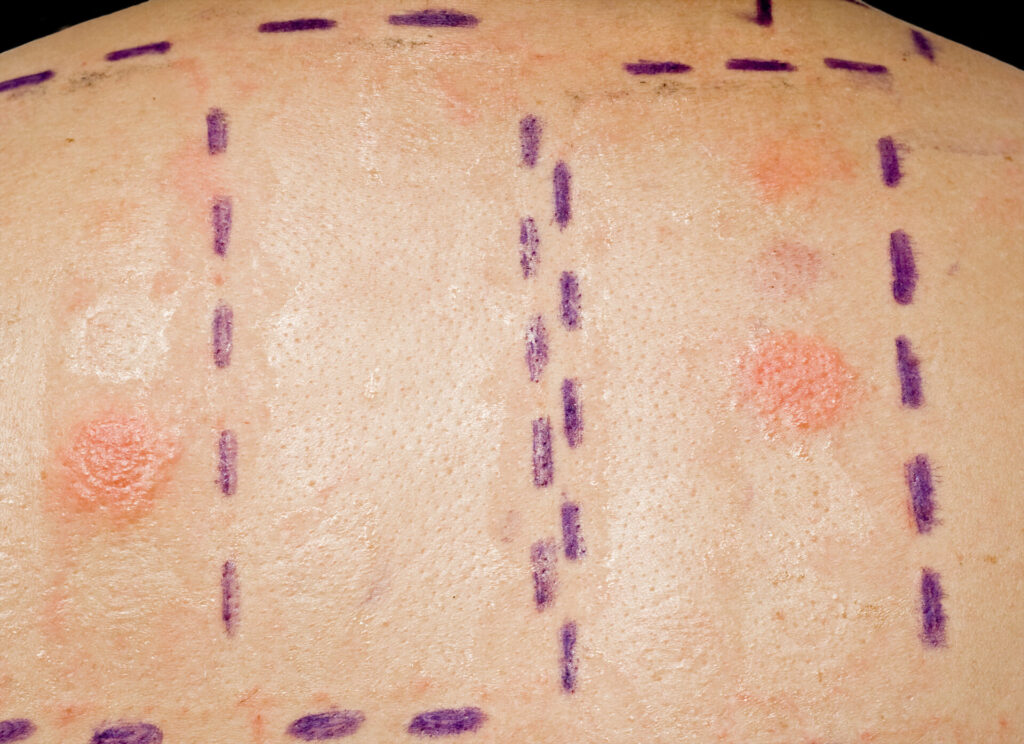Want to know what is worse than experiencing red, itchy skin and the irritation contact dermatitis? Experiencing contact dermatitis but not knowing what your triggers are. You could be allergic to a slew of allergens like detergents, perfumes, and metals, but you unwittingly chalk your reactions up to the medication you take.
To know for certain what your skin allergy triggers are, you have to undergo allergy testing from an expert allergist. Allergy testing allows you and your allergy specialist to understand what your immune system reacts to, the severity of your reactions, and how you should treat your allergies to avoid a dangerous attack.
There are several allergy testing methods available for a variety of allergy types—skin allergies, insect allergies, airborne allergies, etc.— that offer informative and accurate results. The test we are focusing on today is the skin patch test.
What Is the Skin Patch Test?
The skin patch test is used to understand why you develop contact dermatitis. Your provider applies patches that have certain allergens on them to your back since that is the largest, “flattest” area of accessible skin. These patches include anything that could cause your skin to react, including a variety of:
- Antibiotics
- Dyes
- Formaldehyde
- Fragrances
- Latex
- Metals
- Resins
Are There Risk Factors to a Skin Patch Test?

There are possible side effects you can experience with your patch test, the most common and obvious one being a skin reaction that should fade on its own over a few days. Irritation is good, as that tells you what you are allergic to and what you should avoid moving forward.
Additional side effects can include skin darkening, which should also fade, and a psoriasis flare-up is also possible if you suffer from that condition. More severe reactions, including anaphylaxis, are rare but can happen. If you undergo a skin patch test, your team will monitor you to ensure you do not experience anaphylaxis and will apply the proper care in the rare case you do.
What to Expect During a Skin Patch Test
The process of skin patch testing requires more than a single office visit, but it is simple to carry out:
- Your allergist will place the allergen patches on your back.
- You will wear the patches for 48 hours. The allergens you react to will likely cause localized sensations of itchiness, soreness, or overall discomfort, but it is important not to remove them or disturb them in any way. Keep them in place and unbothered for accurate results.
- In 2 days, you will return for a follow-up appointment, where your allergist will remove the patches and observe your skin’s reaction. If there are indications that an allergen caused a reaction, your doctor will know what your trigger is and create an effective treatment plan.
- A few days later, you will revisit for a 2nd follow-up appointment to ensure your doctor did not miss any allergy reactions. Some people experience delayed reactions to their allergy triggers, so the second follow-up helps ensure all reactions are observed and documented. If immediate reactions have not yet healed by this appointment, your doctor will apply treatment to help speed up recovery and soothe your reactions.
How Should I Care for My Skin Patches at Home?
There are steps to take to care for your skin patches to ensure your allergist gathers the most accurate results:
- Do not touch your patches or ask someone to touch them for you. Your patches must be left alone for accurate results.
- Do not get the patches wet. The patches must remain dry for accuracy.
- Keep up with your follow-up appointments. If you don’t, you must undergo the testing portion again.
- Keep your patches covered and stay out of the sun. Heat can affect results.
- Avoid hydrocortisone creams, cortisone medications, or cortisone injections while undergoing testing. Cortisone can skew your results and lead to inaccurate evaluations.
If your skin breaks out and you want to know the cause, request a skin patch test from Langford Allergy today!
Dr. Langford and our team offer thorough allergy testing and can help you understand your skin’s reaction to certain substances. Whether you are allergic to one topical allergen or various metals, fragrances, and medications, we will create an effective treatment and management plan to soothe your skin and minimize reactions. Schedule an appointment or call our office to learn more: 478-787-4728
Related articles:
Start 2023 on the Right Foot with Comprehensive Allergy Testing
Adult and Baby Eczema: A Look at Each
